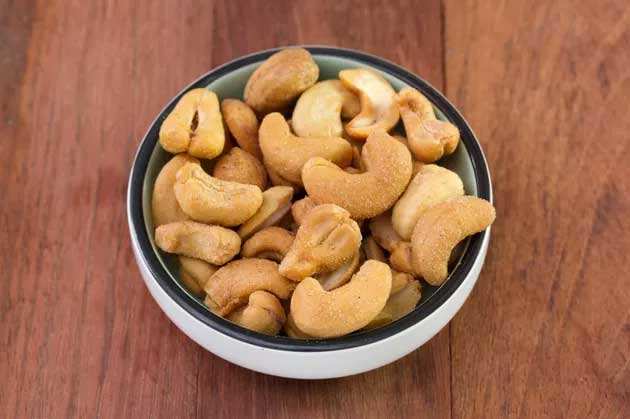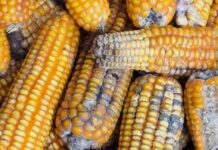
Cashews are a rich source of protein, monounsaturated fats, and nutrients such as copper, iron, magnesium, and zinc. Because they are also low in purines — compounds your body breaks down into uric acid — an individual with gout can include them in her diet. Excess uric acid in the bloodstream accumulates in joints, causing the pain and swelling characteristic of gout. By eating fewer purine-rich foods like beef, organ meats, shellfish like mussels, and certain vegetables in favor of low-purine choices including cashews, you may be able to manage your gout symptoms.
Purine Content
Items with a high concentration of purines are defined as those that contain between 150 to 825 milligrams of purine compounds per 100 grams of food, says the Dial-A-Dietitian Nutrition Information Society of British Columbia. People with gout are advised to eliminate these foods from their diet. A moderate-purine food is one containing 50 to 150 milligrams of purines in every 100 grams and can be eaten in limited amounts daily. Cashews are low in purines, with less than 50 milligrams of the compounds per 100 grams.
Recommended Intake
According to the University of Pittsburgh Medical Center, a gout diet should include approximately 6 ounces of protein-rich foods like cashews each day. The U.S. Department of Agriculture says half an1/2 ounce of nuts is equivalent to a 1-ounce protein serving. Choose dry-roasted over oil-roasted cashews to keep your fat and calorie intake low. In addition, opt for unsalted nuts. A single ounce of salted, dry-roasted cashews contains 181 milligrams of sodium, or 12 percent of the 1,500-milligram daily limit for people on a low-sodium diet.
Protein Substitute
Individuals with gout need to limit their overall intake of protein, particularly animal-based proteins like meat, poultry, and fish. Instead, the bulk of the protein on a gout diet should come from plant proteins, including nuts like cashews. In addition to having a low concentration of purines, cashews are cholesterol-free, have less saturated fat per serving than meat, and are rich in heart-healthy mono- and polyunsaturated fats. Eating less meat and more plant-based protein sources such as nuts is linked to a decreased risk of cancer and heart disease.
Expert Insight
While cashews can play an important role in a gout diet, you will need to eat them in moderation to avoid excess calories that can lead to weight gain. Eating 3 ounces of cashews would supply you with 489 calories, or nearly 25 percent of the daily calorie needs of an adult following a 2,000-calorie diet. To maximize the benefits without too many calories, limit your cashew intake to 1 ounce per day, or approximately 15 whole cashews.
Sources:
- USDA National Nutrient Database: Nuts, Cashew Nuts, Dry Roasted, Without Salt Added
- Myrtue Medical Center: Low Purine Diet – Gout Treatment Diet
- Dial-A-Dietitian Nutrition Information Society of B.C.: Diet for Gout
- UPMC: Low-Purine Diet
- ChooseMyPlate.gov: Protein Foods — What Counts as an Ounce Equivalent in the Protein Foods Group?
- USDA National Nutrient Database: Nuts, Cashew Nuts, Dry Roasted, With Salt Added
- Harvard School of Public Health: Protein — Moving Closer to Center Stage
- Archives of Internal Medicine: Red Meat and Mortality — Results From 2 Prospective Cohort Studies
- Mail Online: How Many Nuts Can I Eat Without Getting Fat?
- Dietitians Association of Australia: Nuts
Important Notice: This article was originally published at www.livestrong.com by Michelle Kerns where all credits are due.
Disclaimer
The watching, interacting, and participation of any kind with anything on this page does not constitute or initiate a doctor-patient relationship with Dr. Farrah®. None of the statements here have been evaluated by the Food and Drug Administration (FDA). The products of Dr. Farrah® are not intended to diagnose, treat, cure, or prevent any disease. The information being provided should only be considered for education and entertainment purposes only. If you feel that anything you see or hear may be of value to you on this page or on any other medium of any kind associated with, showing, or quoting anything relating to Dr. Farrah® in any way at any time, you are encouraged to and agree to consult with a licensed healthcare professional in your area to discuss it. If you feel that you’re having a healthcare emergency, seek medical attention immediately. The views expressed here are simply either the views and opinions of Dr. Farrah® or others appearing and are protected under the first amendment.
Dr. Farrah® is a highly experienced Licensed Medical Doctor certified in evidence-based clinical nutrition, not some enthusiast, formulator, or medium promoting the wild and unrestrained use of nutrition products for health issues without clinical experience and scientific evidence of therapeutic benefit. Dr. Farrah® has personally and keenly studied everything she recommends, and more importantly, she’s closely observed the reactions and results in a clinical setting countless times over the course of her career involving the treatment of over 150,000 patients.
Dr. Farrah® promotes evidence-based natural approaches to health, which means integrating her individual scientific and clinical expertise with the best available external clinical evidence from systematic research. By individual clinical expertise, I refer to the proficiency and judgment that individual clinicians acquire through clinical experience and clinical practice.
Dr. Farrah® does not make any representation or warranties with respect to the accuracy, applicability, fitness, or completeness of any multimedia content provided. Dr. Farrah® does not warrant the performance, effectiveness, or applicability of any sites listed, linked, or referenced to, in, or by any multimedia content.
To be clear, the multimedia content is not intended to be a substitute for professional medical advice, diagnosis, or treatment. Always seek the advice of your physician or other qualified health providers with any questions you may have regarding a medical condition. Never disregard professional medical advice or delay in seeking it because of something you have read or seen in any website, video, image, or media of any kind. Dr. Farrah® hereby disclaims any and all liability to any party for any direct, indirect, implied, punitive, special, incidental, or other consequential damages arising directly or indirectly from any use of the content, which is provided as is, and without warranties.








